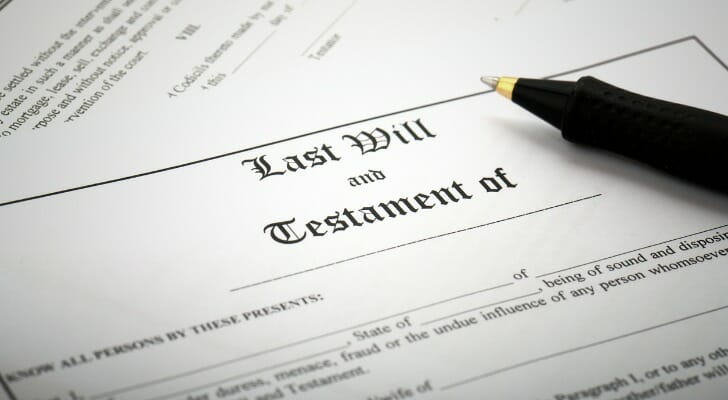As we grow older, estate planning becomes more important. Many people choose to write a will to dictate how to bequeath their property and other assets after they pass away. Choosing the person in charge of carrying out those wishes is almost as important. That’s where the executor of a will comes in. The executor is responsible for making sure all of the deceased’s wishes and financial plans are met. It can be quite an undertaking, so we’ve broken down what an executor is, what their responsibilities are, and how to appoint one.
A financial advisor can provide insight on your estate planning, taxes and more.
What Is an Executor?
An executor is an individual – typically a lawyer, accountant, or family member – responsible for enacting the terms set forth in a last will and testament. The executor is also responsible for paying off any debts that the deceased had when she died. There are very few qualifications required to serve as a will’s executor. As long as an individual is at least 18 years old and has no felony convictions, there shouldn’t be an issue. In some states, the chosen executor can’t reside in another state unless she is a relative of the deceased.
Duties of an Executor: Taxes
It may seem like an executor simply has to follow the instructions of a will. However, there are actually a few steps to the process that the will might not lay out. First and foremost, an executor must pay off any debts and satisfy any creditors that the decedent (the person who has died) might have. This can be credit card debt, personal loans, mortgages, or any other kind of debt. The executor will use the assets of the decedent to pay these debts.
If you pass away with outstanding mortgage debt, there’s a few ways you and your executor can handle it. You can give the home and the payment responsibility to a relative. Federal law mandates that lenders allow family members to assume mortgage payments when they inherit property. If you had a co-signer on your mortgage, payment responsibility may also transfer to them, regardless of whether ownership transfers with it.
If you choose not to bequeath your property, your executor has the option of selling the house and using the proceeds to pay off the remainder of the loan. In the event that the amount of the loan is more than the sale price your executor can get on the house, it’s possible the executor can negotiate a short sale with the mortgage lender.
The executor will also have to pay income tax for the last year of the decedent’s life. Whether the executor will have to also pay estate taxes will depend on the size of the estate and state where the decedent lives. The federal threshold for estate tax is $13.99 million in 2025, but the recently passed One Big Beautiful Bill (OBBA) will increase it to $15 million in 2026. Plus, only 12 states plus the District of Columbia levy estate taxes of their own. So plenty of executors won’t have to worry about estate taxes.
Duties of an Executor: Probate and Asset Transfer

Another key step in the executor’s process is to file the last will in the appropriate probate court. Filing is mandatory by law. Typically, you’ll need to file with the probate court representing the county where the decedent lived at the time of their death. This is also when you’ll determine if the probate court needs to confirm the validity of the will. Whether this is necessary will vary from state to state, but large, complex estates generally need to be probated.
The task that most people associate with an executor is handling the transfer of assets from the decedent to the living beneficiaries. Executors can begin this process once she has satisfied all the decedent’s debts and paid all taxes. The complexity of this transfer will depend on the state and the nature of the assets you’re transferring. Generally, courts recognize that the executor has the final say in matters as they are simply following what’s set forth in the will.
Finally, an executor is in charge of wrapping up any miscellaneous affairs that have remained outstanding since the decedent’s death. This could include canceling credit cards, closing savings accounts, canceling subscriptions, contacting the Social Security Administration or a wide range of other things.
How Do You Appoint an Executor?
There are two primary ways to appoint an executor. First, the person who makes the will, also known as the testator, can name an individual. The testator would stipulate this appointment in the will. Once the testator passes away, the named executor may have to submit a petition to the appropriate probate court to be confirmed as the executor.
If the testator doesn’t appoint anyone, then the court will. The court typically has a standard procedure for determining who to appoint, although it can vary from state to state. Generally, surviving spouses, children, or parents are all high on the list. In these instances, the court may refer to the appointed individual as an administrator rather than an executor.
When Do You Need an Executor?
You may wonder if every estate requires an executor. The answer depends on the size of the estate, the types of assets involved, and whether there are debts to settle. Executors step in when legal steps are needed to transfer property, pay taxes, or close accounts.
- Small estates. Some states have special rules for small estates that let heirs skip the full probate process. For example, if someone dies with only a small bank account or a used car, heirs may be able to claim those assets with a simple affidavit. In these cases, you may not need a formal executor, although someone still needs to handle paperwork.
- Real estate. If the deceased owned a home or land in their name alone, an executor is almost always required. The executor will file the will in probate court and the rightful heirs inherit the house. On the other hand, if the property was held jointly with a spouse, it usually transfers automatically, and the executor may not have to be involved with that asset.
- Debts and taxes. If the deceased left behind credit card balances, personal loans, or unpaid taxes, an executor is needed to pay these from estate funds before beneficiaries receive anything. For example, if the estate includes $100,000 in savings but also $20,000 in credit card debt, the executor must use estate money to clear the debt before distributing the remaining $80,000.
- Complex estates. When the estate includes a business, multiple properties, or valuable items like art or jewelry, an executor plays a key role in organizing appraisals, selling assets if needed, and making sure everything is divided according to the will. Without an executor, beneficiaries may have no legal authority to take these steps.
In short, an executor is needed whenever there are assets or obligations that don’t pass automatically to someone else. Even if an estate seems simple, having an executor ensures that debts are settled and transfers are handled correctly under state law.
Bottom Line

While virtually anyone can serve as the executor of a will, the role carries some big responsibilities. An executor will need to deal with taxes and debts of the decedent, while also executing the wishes laid out in the trust. If appointed executor, you’ll also be responsible for filing the will in probate court and going through the probate process. If you’re asked to be executor of an estate, consider whether you’re up for the job.
Tips for Planning Your Estate
- If the idea of estate planning has you immediately anxious, a financial advisor could be a big help. Finding one doesn’t have to be hard. SmartAsset’s free tool matches you with up to three financial advisors who serve your area, and you can interview your advisor matches at no cost to decide which one is right for you. If you’re ready to find an advisor who can help you achieve your financial goals, get started now.
- When you’re planning your estate, you need to take stock of your assets. This includes any money you have in a workplace retirement account. Find out what you’re likely to have when you retire using our free 401(k) calculator.
Photo credit: ©iStock.com/fizkes, ©iStock.com/roberthyrons, ©iStock.com/eyetoeyePIX
